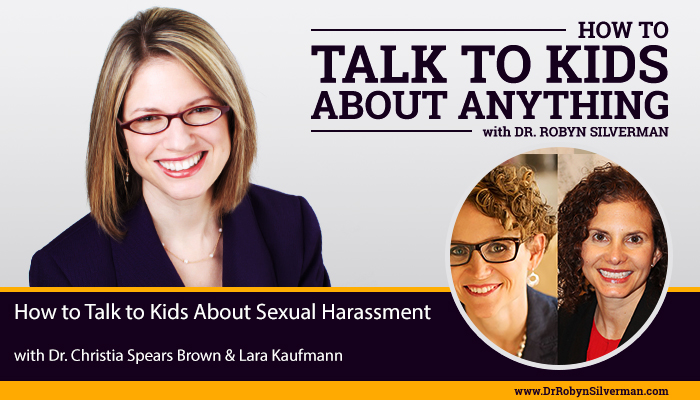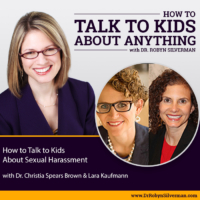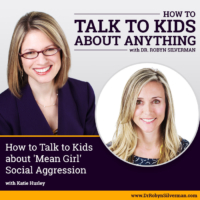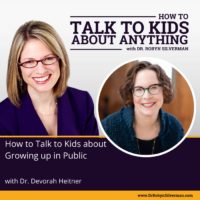Podcast: Play in new window | Download
Subscribe: Apple Podcasts | RSS | More
How to Talk to Kids about Sexual Harassment
This podcast will focus on how parents, teachers and coaches of children K-12 can start talking more openly about sexual harassment and sexual violence. In order for this kind of behavior to stop, everyone much address the norms and stereotypes that fuel it, so all young people can grow up safe, respected and valued.
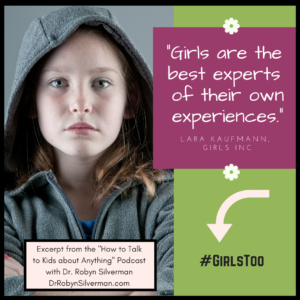 In 2006, Tarana Burke coined the phrase “Me Too” as a way to help women who had survived sexual violence feel like they were not alone. A year ago this week, actress Alyssa Milano reignited “me too” with a tweet that stated “If you’ve been sexually harassed or assaulted write ‘me too’ as a reply to this tweet.” This was in the wake of accusations against movie mogul Harvey Weinstein and other powerful men in Hollywood. Since then, “me too” has become a movement among women who have been sexually harassed. Since then, a great deal of reports have come out and “metoo” has gained great traction among adults. But what about our teens? How are they experiencing sexual harassment and violence? Believe or not, 7 out of 10 girls experience sexual harassment and alarmingly, 1 in 4 girls will experience sexual assault or abuse before she turns 18. A recently released survey of young girls reveals that 3 out of 4 girls between the ages of 14 and 19 feel unsafe at least once in a while. At the root of this problem are limiting and harmful messages about how girls and boys should behave and be treated—messages that shape these impressionable minds and stick with them as they enter adulthood. As a response, and in honor of the 1 year anniversary of the week, Girls Inc, a nonprofit organization that inspires all girls to be strong, smart and bold through direct service and advocacy, along with its amazing network of girls and partners, are launching the #girlstoo campaign. This campaign will focus on sexual harassment and assault in the lives of youth, particularly girls, with actions aimed at addressing the norms and stereotypes that fuel these behaviors. To discuss how we talk about sexual harassment, assault and violence—and what we can all do ensure that our young people are educated, safe, respected and valued, we have Lara Kaufmann and Dr. Christia Spears Brown on the show today.
In 2006, Tarana Burke coined the phrase “Me Too” as a way to help women who had survived sexual violence feel like they were not alone. A year ago this week, actress Alyssa Milano reignited “me too” with a tweet that stated “If you’ve been sexually harassed or assaulted write ‘me too’ as a reply to this tweet.” This was in the wake of accusations against movie mogul Harvey Weinstein and other powerful men in Hollywood. Since then, “me too” has become a movement among women who have been sexually harassed. Since then, a great deal of reports have come out and “metoo” has gained great traction among adults. But what about our teens? How are they experiencing sexual harassment and violence? Believe or not, 7 out of 10 girls experience sexual harassment and alarmingly, 1 in 4 girls will experience sexual assault or abuse before she turns 18. A recently released survey of young girls reveals that 3 out of 4 girls between the ages of 14 and 19 feel unsafe at least once in a while. At the root of this problem are limiting and harmful messages about how girls and boys should behave and be treated—messages that shape these impressionable minds and stick with them as they enter adulthood. As a response, and in honor of the 1 year anniversary of the week, Girls Inc, a nonprofit organization that inspires all girls to be strong, smart and bold through direct service and advocacy, along with its amazing network of girls and partners, are launching the #girlstoo campaign. This campaign will focus on sexual harassment and assault in the lives of youth, particularly girls, with actions aimed at addressing the norms and stereotypes that fuel these behaviors. To discuss how we talk about sexual harassment, assault and violence—and what we can all do ensure that our young people are educated, safe, respected and valued, we have Lara Kaufmann and Dr. Christia Spears Brown on the show today.
Lara S. Kaufmann is Director of Public Policy for Girls Inc.,
where she leads the organization’s work to advance girls’ rights and opportunities and empower girls to advocate for social change. Prior to joining Girls Inc., Ms. Kaufmann was Senior Counsel and Director for Education Policy for At-Risk Students at the National Women’s Law Center, where she engaged in litigation, advocacy, and outreach to improve educational outcomes for at-risk girls and young women. She is a graduate of the University of Michigan and Northwestern University School of Law.
Dr. Christia Spears Brown is a Professor of Developmental and Social Psychology at The University of Kentucky and the Director of the Center for Equality and Social Justice. Her research focuses on children’s experiences with discrimination and the development of gender and ethnic stereotypes. As part of her research, she examines the perpetration and acceptance of sexual harassment among adolescents and the consequences of sexual objectification of girls and toxic masculinity among boys. She also works to translate her work for both public policy and parents. Her book titled, Parenting Beyond Pink and Blue: How to Raise Your Kids Free of Gender Stereotypes, describes research on gender development and offers guidance for parents for reducing the impact of gender stereotypes on their children
The podcast provides:
- How “boys will be boys” can harm girls and boys
- How sexual harassment affects girls
- If sexual harassment is preventable
- How parents and teachers can help girls to be knowledgable and assertive about sexual harassment
- Why girls are often silent about sexual harassment
- What to say to boys and girls about sexual harassment
- How bystanders can be upstanders
- How to #metoo movement can include the #girlstoo component
- What parents and teachers can do right no0w to combat sexual harassment
Important Messages:
- Girls receive messages that people are going to objectify them and this is just part of life- that this is what boys do.
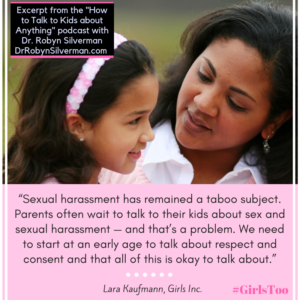
- Boys get messages that this is what they are supposed to do and if they don’t, they’ll get teased.
- The Girls Inc survey showed that the number one thing that girls are concerned about is sexual harassment and sexual violence (and this was done a year before the #metoo movement took flight.
- Research tells us that when girls are sexually harassed they are much more likely to be depressed, anxious, have insomnia, stomach aches, headaches, poor body image, poor body image, do worse in school and want to avoid school. They are worse off in every way that we can measure— whether it be physical, psychological, social or academic.
- Hormones and sexual interest is normal in the teen years- we need to teach kids how to show sexual interest in ways that aren’t harming the other person.
- A lot of sexual harassment is about making comments about body parts or rating body parts, asking for sexier naked photos, cat calling to them in the hallways.
- Part of what we need to teach boys is that sexual harassment does damage to girls (even if they don’t realize it). Need to humanize girls to the boys. Need to teach the boys that you are dealing with a whole, real person. Sexual harassment doesn’t show girls that they are whole, real people.
- Boys need to support boys in making good decisions around girls. Other boys need to hold their friends accountable.
- Girls often feel that their reports fall on deaf ears— or that they are being penalized for coming forward.
- For cultural change to happen around sexual harassment, we’ll need more education around it in schools in sex ed— around consent, what is sexual harassment.
- This is not just one conversation. And we need to get comfortable with these conversations. Men need to come to the conversation too.
- Have these conversations from the beginning with your kids. Start early. Point out when a woman is being sexually objectified.
- Girls need to know that sexual harassment isn’t normal and to have a game plan of what to say and do (and who to go to) when it happens is important.
- Research shows that girls with emotionally supportive mothers are much more likely to seek out support after sexual harassment.
- Have a script! If a boy says this to you, what can you say back? It needs to be realistic. In their language.
- Make sure girls know who they can talk to, what to say, how you should respond, and the broader issues of what society is saying about girls. They need to know that there are stereotypes but this is not really what girls are all about.
- Girls are being reprimanded for what they are wearing and how their clothes might be encouraging boys to engage in sexual harassment without giving a thought to the fact that these are the clothes that are being sold to girls!
- The come-back to shut down sexual harassment in action may be different depending on personality. Ask them, what do YOU think would work? These are individual girls that this issue is affecting. We need to be mindful of that.
- It can be very hard to say something in the moment.
- Teach kids to be upstanders— and help others by speaking up.
- Any kind of support-support-seeing can help girls cope.
- From the girls who spoke up when Nassar was abusing them in the gymnastics world to the girls who are speaking up on playgrounds when it’s “Slap-ass Fridays” (when the girls are slapping their bottoms on playgrounds), girls need to be believed and taken seriously when they come forward and speak up.
- Teachers need better tools when this happens.
- We need to talk to boys about what sexual harassment is— and how we talk to girls. Often people think that those who are doing the sexual harassment are these sexual predators that stalk the streets- when it’s often perfectly nice boys who don’t know how to talk interact with girls and who are facing a lot of pressure from other boys to objectify girls and to be sexually assertive. What kind of pressures are you receiving?
- Teaching boys about chivalry can backfire— teach them instead about respecting everyone.
- When we make comments, as parents, about how a girl looks, we may be reinforcing the notion that a girl’s value comes from her looks.
- Boys experience sexual harassment and violence— particularly LGBT boys. We need to shift the culture.
- Start having these conversations— and make sure girls know that if it happens to them, that you will believe them. Then check in with them periodically. (non-threatening way— if you heard about it happen to someone else, or in the news)
- Give agency to girls.
- Make sure that home in a safe place- they aren’t alone- and they can talk about anything.
- Pick out objectifying imaging in print media with girls. Help them to be critical of media messaging. They can be reject what is in the media.
Notable Quotables:
- “Even when girls are not the target of the objectification in the moment, they recognize it as part of the culture of middle
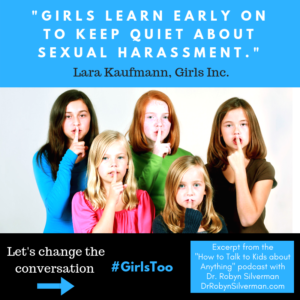 schools and high schools and until we start to really focus on it, no girl is going to be able to grow up to be her best self.” (Christia Brown)
schools and high schools and until we start to really focus on it, no girl is going to be able to grow up to be her best self.” (Christia Brown) - “Girls are the best experts of their own experiences.” (Lara Kauffman)
- “Sexual harassment and sexual violence is something that almost all girls are experiencing or are acutely aware of and it has a huge impact on their lives.” (LK)
- “Whether it be physical, psychological, social or academic, the more girls experience sexual harassment, the worse they are doing in all of these facets of their lives.” (CB)
- “We need to teach boys to humanize a girl instead of objectifying her— to see her as a whole person who can be scared or uncomfortable. (LK)
- “Sadly, girls learn early on to keep quiet about sexual harassment.” (LK)
- “Sexual harassment is preventable but it does involve a culture change. Raising awareness that it matters and that it’s not a necessary part of adolescent interactions is the first step.” (CB)
- “We need to treat sexual harassment like we do bullying. Almost all schools have a zero-tolerance bullying policy but almost none talk about sexual harassment, assault or consent.” (CB)
- “Sexual harassment is damaging. Just because sexual harassment is common, doesn’t make it inevitable and it doesn’t mean it’s not harmful.” (CB)
- “We need to help girls recognize that being sexually objectified is actually damaging and they are much more important than their sexual body parts.” (CB)
- “Girls with emotionally supportive mothers are much more likely to seek out support after sexual harassment.” (CB)
- “It’s really important to help girls develop a script for what to say when a boy says this to you— what can you say back?” (CB)
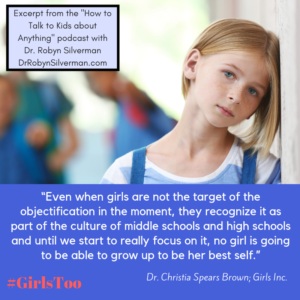 “Sexual harassment has remained a taboo subject. Parents often wait to talk to their kids about sex until they may be at an age when it might be appropriate for them to be engaging in sexual activity and not before then— and that’s a problem. We need to start at an early age to talk about respect and consent and that all of this is okay to talk about.” (LK)
“Sexual harassment has remained a taboo subject. Parents often wait to talk to their kids about sex until they may be at an age when it might be appropriate for them to be engaging in sexual activity and not before then— and that’s a problem. We need to start at an early age to talk about respect and consent and that all of this is okay to talk about.” (LK)- “Girls get blamed a lot when sexual harassment happens. People are especially critical of what girls wear and how it might be encouraging boys without even thinking about the fact that these are the clothes being sold to girls in our society.” (LK)
- “It’s hard to make a grand moral statement about injustice in a hallway of a middle school or hard school. It has to be said in the vernacular of the adolescent— not of their parents.” (CB)
- “Part of the key to stopping sexual harassment is teaching kids to be up standers and stand up for one another. In the moment, the victim or target may not feel empowered to speak but someone around her should.” (LK)
- “We need adults to start take girls seriously when they come forward.” (LK)
- “Boys are doing these really damaging behaviors but schools don’t really say that it’s inappropriate to talk to girls like that so it’s hard for us to blame the boys for just dealing with what they’ve been socialized to do.” (CB)
- “As parents, we are socialized too. We may unwittingly reinforce some of these negative messages kids are getting from the media.”
- “Until we get the the point where we are rejecting these stereotypes and being conscious of them and no longer tolerating sexual harassment and violence as we know it, we are still going to see these patterns over and over again. We do think we can create a culture of respect for today’s girls, for generations to come, to create a community where all youth can grow up safe and respected and can learn and thrive and succeed free from sexual harassment and violence.” (LK)
Resources:
Take the #girlstoo pledge!
Parenting Beyond Pink and Blue: How to Raise Your Kids Free of Gender Stereotypes (Book by Dr. Christia Brown)

